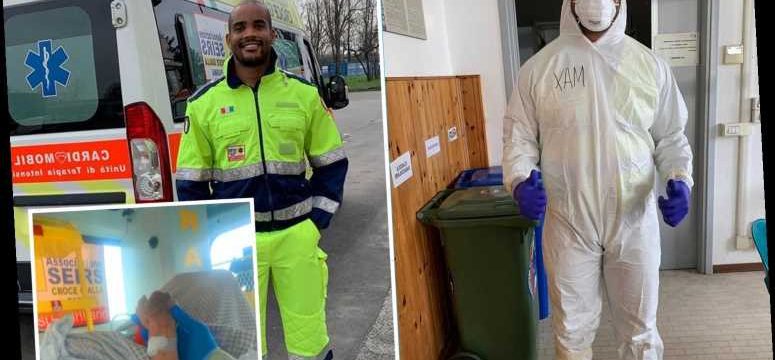ITALIAN rugby star Maxime Mbanda worked 13-hour shifts as an ambulance driver to help the fight against coronavirus.
The flanker, 28, plays his club rugby for Zebre in Parma in northern Italy but all their matches were suspended earlier this year as the deadly outbreak devastated the country.
And with far more time on his hands and desperate to help out in whatever way he can while still fit, Mbanda supported the healthcare system in his homeland by doing gruelling shifts.
He told AFP in March: "When everything was cancelled in rugby, I wondered how I could help, even without medical expertise.
"I started eight days ago, without a day's break and with shifts of 12 or 13 hours. But faced with what I see in the infectious disease rooms, I tell myself that I can't be tired.
"Fear is normal. But there are little things that can be done safely that would give those on the front lines a half-hour or an hour's rest. For them, an hour is crucial.
"As long as I'm strong, I'll keep going. I'm here and I'm staying here.
"I found the Yellow Cross, which had a transport service for medicine and food for the elderly.
If people saw what I see in the hospitals, there wouldn't be a queue in front of the supermarkets anymore. They would think two, three or four times before leaving home, even to go running.
"I found myself transferring positive patients from one local hospital to another. I help with the stretcher or if there are patients to be carried from a wheelchair. I also hold the oxygen."
Mbanda's dad is a surgeon so the 18-cap Italian is well aware of the pressure currently on medics in Italy.
So far 6,077 have died from the deadly bug in Italy – the worst-affected country in the world – but there are some signs of hope with the death toll slowing for the last two days.
After seeing the horrific consequences of the disease first-hand, Mbanda called on his fellow citizens to stay indoors and obey government advice in order to slow the spread of coronavirus.
He added: "When you see the look in their eyes… even if they can't speak, they communicate with the eyes and they tell you things you can't imagine.
"They hear the alarms, the doctors and nurses running from one ward to the next.
"The first person I collected from the hospital told me that he had been there for three hours when the neighbour in the next bed died. And during the night, two other women died in his room. He had never seen anyone die.
"If people saw what I see in the hospitals, there wouldn't be a queue in front of the supermarkets anymore. They would think two, three or four times before leaving home, even to go running.
"What I see are people of all ages, on respirators, on oxygen. Doctors and nurses on 20- or 22-hour shifts, not sleeping one minute of the day and just trying to get some rest the next day."
Source: Read Full Article






